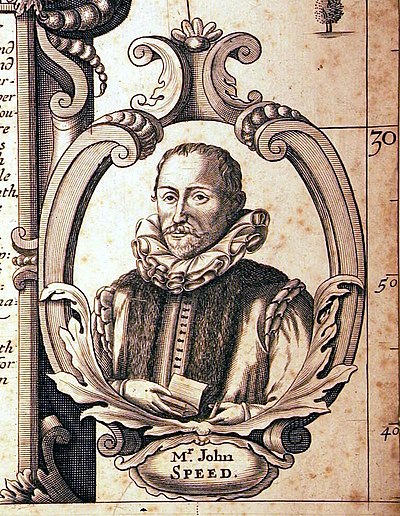I may be going further back into Speed family history than is needed. I have found, though, that while investigating topics for these blogs I discover things so interesting that it is impossible not to talk (or write) about them. So it is with the Speed family. Some background information will help explain the life of John Speed and how he came to establish Farmington..
The Speed family originated in England. The first John Speed (1551 or 2 – 1629) of note was actually an English historian. This John Speed is credited with developing scriptural genealogy tables that appeared in the first edition of the King James Bible. He later wrote a history of England that covered the nation’s rise through the reign of James I. Talent and an interest in public affairs were long evident as a family trait.
The great grandson of John Speed, James, brought a branch of the family to Virginia in 1695. His namesake, Captain James Speed (a grandson) joined the Patriot side in the American Revolution. Captain Speed was wounded at the Battle of Guilford CourtHouse. For his service he was awarded a large land grant in Kentucky. In 1782, according to his great grandson Thomas Speed, Captain Speed moved to the Danville area with his wife, Mary, their six children, and “a number of slaves.” According to family documents this move had to be difficult for the family because Captain Speed’s wounds were debilitating and painful. In addition, the family had to travel over the Wilderness Trail which was still so rugged that no wheeled vehicles could navigate the terrain.
The main subject of our attention, John Speed, the patriarch of Farmington, was 10 years old when his father moved the family to Kentucky.
Already some of the major themes in the lives of the Speed family come into focus. The Speeds tended to be very industrious. No doubt, they worked very hard. They were devoted family members. The Speeds were very patriotic and as John Speed wrote about his father they were willing to “shed their blood for liberty and equal rights.” This, of course, begs the question: For whom were they willing to “shed their blood for liberty and equal rights”? Notably, not all of the people who moved to Kentucky with the family had either liberty or equal rights.
That being said, the Speed family almost immediately became influential in Kentucky. Though he had no training in the law, James Speed became a judge. He served as a member of the Kentucky conventions of 1783, 1785, and 1787. These conventions were part of a series of meetings that eventually led to Kentucky becoming the 15th state.
Captain James Speed was very active in state politics and the community around Danville. He ran in an election to be a delegate to the state’s Constitutional Convention in 1792 but lost. According to his great grandson, he was defeated because he was an “emancipationist.” Trying to define the word emancipationist in 2025 is difficult and actually may require a future posting all by itself. For now, I will say that it identifies that a person is opposed to enslavement but believes state laws should be written to encourage enslavers to free the people they hold. So, Captain Speed was opposed to the concept of slavery but still enslaved people and used their labor to maintain and grow his wealth. Such are human complexities.
Captain James Speed died on September 3, 1811. At the time he was living just outside Danville and he is buried there.
Next, we will investigate the life of Farmington’s Judge John Speed. Until then, my best to you.
David

